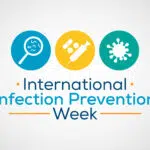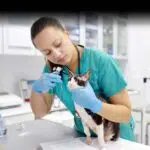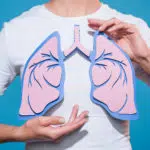International Infection Prevention Week (I.I.P.W.) is observed every third week of October to educate stakeholders and the general public on the importance of preventing the spread of illnesses and infectious agents. This year, it is held from October 19 to 25. Infections ranging from hospital-acquired to those found in homes or workplaces can compromise healthcare workers’ efforts and have a detrimental impact on public health. Every year, secondary infections cause thousands of health concerns in hospitals. Global pandemics are also sparked by the rapid spread of infectious pathogens. The I.I.P.W.’s goal is to learn more about infection prevention and how it might help improve patient safety.
History of International Infection Prevention Week
In 1986, President Ronald Reagan of the U.S. established the International Infection Prevention Week, to be observed every third week in October. It was formed to solve the problem of infections plaguing the nation. From the United States, this week has spread throughout Europe, Asia, Africa, and other regions of the world. The week’s events are spearheaded by the Association of Professionals in Infection Control and Epidemiology (A.P.I.C.)
Every year since its inception, over three decades ago, themes that revolve around infection prevention are set by A.P.I.C. Presentations and publications about the set theme are made to keep everyone abreast of the latest trends in preventing infections.
The 2016 edition of the week focused on strategies to stop illnesses from spreading, as symbolized by the chosen theme: ‘Break the Chain of Infection.’ The theme for 2021 was ‘Make Your Intention Infection Prevention,’ which urged people to improve personal hygiene. The 2020 commemoration, on the other hand, was intended to honor infection preventionists (I.P.’s) for the excellent work they have done and continue to do to keep the globe safe from pandemics. According to studies, I.P.’s can lower hospital-associated infections by at least 30%.
Poor hospital and hygienic practices rank high among the leading causes of infections. The WHO confirmed that by saying, “No country, no healthcare facility, even within the most advanced and sophisticated healthcare systems, can claim to be free of the problem of H.A.I.s.” In the U.S. alone, a report by the C.D.C. showed that at least two million illnesses and 23,000 deaths are caused by antibiotic-resistant bacteria each year. This number rises in areas where sanitary procedures are lax and healthcare facilities are poorly administered.
International Infection Prevention Week timeline
Laws on public health begin to appear all through Europe.
The first hospital for infectious diseases is established in London.
The Center for Disease Control and Prevention (C.D.C.) is established.
The Association of Professionals in Infection Control and Epidemiology (A.P.I.C.) is founded.
President Ronald Reagan proclaims the third week of October to be International Infection Prevention Week.
International Infection Prevention Week FAQs
What is the most common infection?
With more than one-fourth of the world population infected, Hepatitis B ranks as the most common infection.
What is the most common route of infection?
Contact is the most common route of infection. It is divided into two — direct and indirect. The hands are the primary means by which direct contact is made possible. This is why proper handwashing with soap and water is always advised.
Who is more vulnerable to infections?
Generally, people with a weak immune system are more prone to infections than those with strong immunity. Elderly people whose immune cells have worn out, little children whose immune cells have not fully developed, and immune-suppressed individuals, as well as H.I.V. patients, are generally more vulnerable to infections.
How to Observe International Infection Prevention Week
Read about infection prevention
Update your knowledge and understanding of ways and recent trends in preventing infections. Learning about infection prevention and control practices is important in maintaining a safe environment for everyone by reducing the risk of the potential spread of disease.
Practice personal hygiene
Attempt to increase the level of your hygiene. Wash your hands with soap and water more frequently. Clean surfaces around your house.
Inform about infection prevention
Inform relatives, friends, and acquaintances about the need for infection prevention and the advantages of doing so. This will enable them to practice good hygiene at all times.
5 Interesting Facts About Infectious Agents
Mostly spread by hand contact
Almost 80% of infectious agents are spread by the hands.
Remote controls spread them
Remote controllers are the most common carriers of infectious pathogens and are a key source of illness dissemination.
Keyboards carry more infectious agents
Phones, computers, and A.T.M. keyboards carry more germs than toilet seats.
Office desks surpasses toilets in germ population
Uncleaned office desks and tables may contain around ten million bacteria — more than can be found in toilet seats.
Toilet flushing levitates germs
On flushing toilets, infectious diseases can rise to six feet and cling to the user's clothing.
Why International Infection Prevention Week is Important
It increases our understanding of infections
Information and presentations made during the week broaden our understanding of infections and how to prevent them. It teaches us to learn to recognize infection risks, and to take action to protect ourselves, no matter the situation.
It compels us to live hygienically
Activities in the week prick the hygienic conscience of the public and probe them to practice hygienic living. Maintaining hygiene practices reduces the spread of illness and the risk of medical conditions. It also increases self-confidence and positively impacts personal relationships.
It enhances the world's healthiness
Imbibing the preventive measures suggested during the week helps to improve the general health of people around the world. Good health is central to human happiness and well-being that contributes significantly to prosperity and wealth and even economic progress, as healthy populations are more productive, save more and live longer
International Infection Prevention Week dates
| Year | Date | Day |
|---|---|---|
| 2024 | October 20–26 | Sunday–Saturday |
| 2025 | October 19–25 | Sunday–Saturday |
| 2026 | October 18–24 | Sunday–Saturday |
















